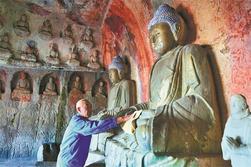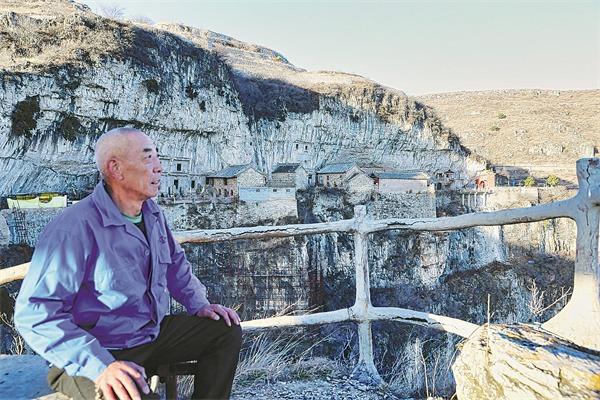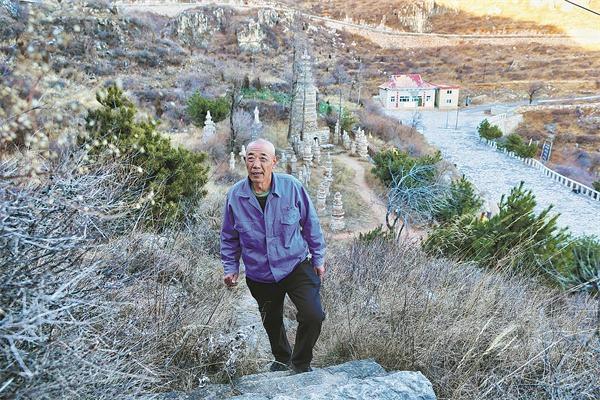 Feng Kaiping dusts Buddha statues at Jindeng Temple in Pingshun county, Shanxi province.(LI YUAN / CHINA DAILY)
Feng Kaiping dusts Buddha statues at Jindeng Temple in Pingshun county, Shanxi province.(LI YUAN / CHINA DAILY)
Feng Kaiping, 64, is the sole night watchman guarding the Jindeng Temple, in Pingshun county of North China's Shanxi province, since 1995.
The temple is perched on a cliff of the Taihang Mountain, about 1,500 meters above sea level. Built on a narrow platform dug on the cliff in the 16th century during the Ming Dynasty (1368-1644), the temple boasts around 500 Buddha statues carved in grottoes.
The oldest statues and grottoes at the temple date back to the 6th century and are regarded as national treasures
Feng was a father of three and doing odd jobs in the county troupe when his former teacher and then cultural relics protection chief in the county came to offer him the job of night watchman at the temple in 1995, after the last temple guard, who was in his 70s, died of illness.
Feng's wife Meng Ximei was fiercely opposed to him taking up the job, as she knew living in the temple, which is nearly 25 kilometers away from the nearest town, meant living the life of an ascetic.
ALSO READ: Cave treasures saved
However, Feng managed to convince her to agree to his taking up the job, as it meant a stable income for the family.
Although the temple was recognized as a national cultural relic way back in 2006, it had no power supply till two years later, and a new access road came up several years later, in 2018. That meant the living conditions in the temple were harsher than what the "stable income" would have provided.
To make life easier, Feng began growing potatoes — hares and birds eat up most other vegetables — in the mountains, burned firewood he collected and drank water trickling down from a cliff and forming a pool in a hall of the temple.
 Feng and the temple that he has guarded since 1995 in Pingshun.(LI YUAN / CHINA DAILY)
Feng and the temple that he has guarded since 1995 in Pingshun.(LI YUAN / CHINA DAILY)
"The pool is my only source of water here, but some tourists love throwing coins into it to pray for good luck. Some even wash their hands and feet," Feng said. "I kept telling them not to do that, but they don't listen. I have now given up telling them that."
The food, mainly steamed buns offered in pilgrimage to the Buddhas, is like a godsend. "After eating potatoes three times a day for nearly 30 years, the taste of wheat and flour is heavenly," Feng said. The temple is seeing more pilgrims and visitors ever since the new access road came up.
Feng has never seen the "golden lights" some old monks said "illuminated" the temple at night, giving the temple its name, Golden Lights Temple. He has always found it to be pitch dark and quiet at night, but for the whistling winds.
ALSO READ: 1600-yr-old grottoes in northwest China under digital protection
"The nights became more bearable after I bought a radio," Feng said. He seldom goes back home, which is hours away on foot, as he is yet to find someone who can fill in for him while he is away.
He learned the importance of his job soon after he joined. In 1996 and 1997, the temple was robbed four times; several wooden Buddha statues were stolen. Feng tried his best to fight the robbers but was outnumbered and injured; the robbers were armed with knives and sticks.
The oldest statues and grottoes at the temple date back to the 6th century and are regarded as national treasures.
"If attacked again by robbers, my wounds will ultimately heal, but the cultural relics will be lost forever. So I will do all I can to protect these cultural relics," Feng said.
He has also won the understanding of his wife and children with his sense of responsibility.
 Feng patrols the property of the temple.(LI YUAN / CHINA DAILY)
Feng patrols the property of the temple.(LI YUAN / CHINA DAILY)
"Seeing him lead such a difficult life for so long without showing any regret, I realize there must be something special about his post," said Meng. "He cannot sleep well at home now, as he is always worried his temporary replacement may not take good care of his 'baby'."
Weather and natural disasters are other threats to the relics.
In the second half of last year, heavy rains lashed Shanxi for nearly a month. Although there was no flooding on the mountain cliff, the moisture and torrential rains gave Feng many a sleepless night, as he did all he could to ensure the relics remained safe.
Five years ago, Feng was given a national honorary title as "guardian angel of cultural relics" for his contribution toward safeguarding the treasures. "There must be hundreds of such guards of cultural relics in the province alone, not to mention nationwide," Feng said.
READ MORE: Centuries-old temple poised to show its new face
"They are the unsung heroes who are taking care of the nation's cultural and historical heritage, so that future generations can still appreciate their beauty."
Feng was happy that the living condition in the temple has become much better over time. Cameras have been installed at the temple and linked to local public security stations. Once he retires, in 2024, someone else will fill his post. "This is like a relay race. I can honestly say that I have tried my best to do my bit," said Feng.


